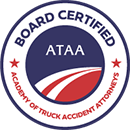Deadhead Trucking
Commercial motor vehicles are meant to carry payloads across the country. Ideally, trucking companies and drivers will drop off one load and then pick up another. But when there’s no cargo at the destination, then the driver will need to drive an empty trailer.
These vehicles can be more susceptible to certain types of incidents, such as rollovers and jackknifing. As a result, these incidents can lead to serious injuries and even fatalities.
At the Trucking Injury Law Group, we know that these vehicles can be dangerous on the road. Here’s what you need to know about deadhead trucking and the potential for accidents.
What Is Deadhead Trucking?
Deadhead trucking is a term you might hear in the trucking industry. When a truck driver transports an empty trailer after delivering cargo, that practice is known as deadheading. While many drivers and companies try to remain efficient, there are times when the driver completes the delivery and returns with an empty trailer.
Deadheading leads to wasted time, fuel, and resources. It is also a dangerous practice on the road. Commercial motor vehicles are meant to carry a certain amount of weight. An empty trailer can cause maneuverability problems for the driver, which can lead to serious situations for other occupants on the road.
Types of Truck Accidents Caused by Deadheading Vehicles
Truck accidents are a major concern throughout the country. According to the National Safety Council, there were 117,300 large trucks involved in crashes resulting in injury in 2021. With empty trailers traveling on the roads, are they more susceptible to tragic incidents?
Unfortunately, deadheading can lead to a wide variety of accidents. In one Australian study, it was shown that empty tractor-trailers were two and a half times more likely to end up in a crash.
Other drivers, passengers, and even pedestrians can be seriously hurt or even killed in these crashes. With the uneven weight distribution, these trucks can be harder to control on the highways. Once you add in driver negligence, it can lead to a disaster. Some of these accidents can include:
- Rear-end collisions: Without a load to stabilize the vehicle, the truck accelerates at a faster speed and is not able to stop in time to avoid an accident.
- Jackknifing: Deadhead trucks are susceptible to jackknifing as the empty trailer swings outward from the cab.
- Rollovers: Since there is no weight at the end of the trailer, these vehicles can roll over in high winds or when making a sharp turn.
When not operated in a safe manner, all trucks can be dangerous on the road. However, with an empty trailer, the chances of an accident can increase if the driver is not careful on the road.
These accidents can lead to:
- Spinal injuries
- Traumatic brain injuries
- Broken bones and bruises
- Scarring and disfigurement
- Fatalities
These injuries can result in extensive medical bills, lost wages, rehabilitative costs, and other expenses. If the driver was at fault for the accident, then you may be able to recover compensation. However, you and your legal team will need to determine whether the driver breached their duty of care while operating a deadhead truck on the road.
Is Deadheading Considered a Duty of Care Breach?
In the trucking industry, the driver does have a duty of care while operating the vehicle. This requires truck drivers to exercise reasonable caution to prevent harm to others on the road. With that, truck drivers and their employers must adhere to traffic laws, maintain their vehicles properly, and drive safely.
Along with that, they are responsible for ensuring that their vehicles are in good working condition. Plus, they need to comply with all safety regulations and standards. Throughout any trip, the driver needs to make sure that they take steps to protect others on the roadway.
Is operating without cargo a breach of the duty of care? As long as the driver operated the truck safely, that duty was not breached.
However, as we have seen in many instances, that is not always the case. No matter whether the vehicle has cargo or not, the driver must still exercise reasonable care to prevent causing harm to others on the road. Unfortunately, some operators can act in a way that is not unsafe, whether they have a full cargo load or not.
Deadheading is not inherently a breach of duty. However, if a driver engages in negligent behavior during deadheading, such as reckless driving, violating regulations, or neglecting vehicle maintenance, it could be considered a breach. Some factors that may lead to a breach of duty include:
- Fatigue: If a tired driver operates the empty truck during deadheading, it could lead to impaired judgment and reaction time.
- Distraction: Distracted driving, such as using a phone during deadheading, can be a breach of duty.
- No vehicle inspection: Neglecting to inspect the truck before deadheading may lead to mechanical failures, including brake failure or tire blowouts.
- Speeding or aggressive driving: These behaviors can endanger other road users, especially when the truck is carrying an empty trailer.
- Not adjusting to weather conditions: Failing to adjust driving behavior based on weather conditions can be a breach.
These negligent behaviors may result in dangerous accidents, leading to severe injuries or even fatalities.
In any deadheading trucking accident, you will have to prove negligence. As stated, the driver operating the vehicle has a duty of care on the road. While deadheading is not considered a breach, if the driver (or company) acted in a manner that led to the accident, then you may have a legal claim.
When it comes to proving negligence, causation and harm are two elements that must be established. There must be a clear link between the breach of duty and the harm suffered to establish negligence. For example, if a truck driver fails to take reasonable care while deadheading, which leads to an accident, such as a collision, injury, or property damage, this could be considered a breach of duty.
Without a clear connection between the breach and the harm, it may be difficult to prove negligence.
However, when you work with an experienced trucking accident lawyer, they can help analyze evidence, interview witnesses, and put the pieces together to establish a connection between the driver’s action and your injuries.
Get the Help You Need for Your Deadhead Trucking Accident Case
Deadhead trucking occurs every day on the roads. Unfortunately, under the wrong conditions, these trucks can end up in serious accidents. Whether it was the fault of a reckless driver or a negligent trucking company, you will want to hold those responsible parties accountable for their actions.
At Trucking Injury Law Group, we can help you proceed with a legal claim for your injuries, damages, and other losses. If you have been injured in a rollover or rear-end collision due to a deadhead truck, make sure to schedule a consultation. Contact us today to learn more about your legal options.






